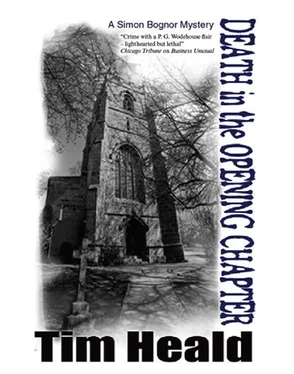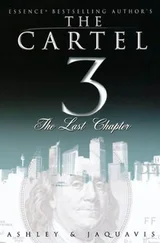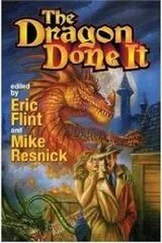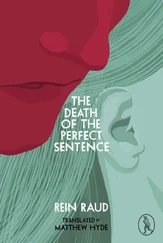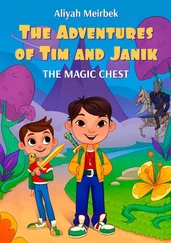Tim Heald - Death in the opening chapter
Здесь есть возможность читать онлайн «Tim Heald - Death in the opening chapter» весь текст электронной книги совершенно бесплатно (целиком полную версию без сокращений). В некоторых случаях можно слушать аудио, скачать через торрент в формате fb2 и присутствует краткое содержание. Жанр: Криминальный детектив, на английском языке. Описание произведения, (предисловие) а так же отзывы посетителей доступны на портале библиотеки ЛибКат.
- Название:Death in the opening chapter
- Автор:
- Жанр:
- Год:неизвестен
- ISBN:нет данных
- Рейтинг книги:5 / 5. Голосов: 1
-
Избранное:Добавить в избранное
- Отзывы:
-
Ваша оценка:
- 100
- 1
- 2
- 3
- 4
- 5
Death in the opening chapter: краткое содержание, описание и аннотация
Предлагаем к чтению аннотацию, описание, краткое содержание или предисловие (зависит от того, что написал сам автор книги «Death in the opening chapter»). Если вы не нашли необходимую информацию о книге — напишите в комментариях, мы постараемся отыскать её.
Death in the opening chapter — читать онлайн бесплатно полную книгу (весь текст) целиком
Ниже представлен текст книги, разбитый по страницам. Система сохранения места последней прочитанной страницы, позволяет с удобством читать онлайн бесплатно книгу «Death in the opening chapter», без необходимости каждый раз заново искать на чём Вы остановились. Поставьте закладку, и сможете в любой момент перейти на страницу, на которой закончили чтение.
Интервал:
Закладка:
‘You found him,’ said Bognor, sipping. ‘That must have been a terrible shock.’
She seemed to consider this for a while, and then said, ‘Not really. Sebastian said he’d be back for an early supper around six thirty. I’d made macaroni cheese. He was fond of my macaroni cheese. He used to say that it was what he had married me for.’
She sniffled, and dabbed at her eyes and nose with a rather weedy handkerchief. Bognor felt that a true gentleman would have reached in his breast pocket and offered a sturdier one of his own. For all sorts of reasons, he failed to do this, but let her tell her story in her own way.
‘He hadn’t been himself recently,’ she said. ‘Not really. Not the old Sebastian. Not quite the man I knew and loved.’
‘In what way?’
Once more, she seemed to be thinking about the question for the first time, even though it was obviously one which she had asked herself many times. Eventually, she said, ‘I’d never seen a dead body before. Sebastian was my first. I hope he’s my last. He seemed so, well, dead. Somehow, he wasn’t what I’d expected. It was the deadness that I found so unexpected. It was as if all the life had gone out of him. I can’t really describe it, except to say that he was deader than I had expected. Very dead, indeed.’
‘But you say he hadn’t seemed himself. What exactly do you mean by that?’
He was beginning to become used to her habit of considering each question as if it was brand new. He found it reassuring.
‘He was having doubts,’ she said, eventually. ‘He’d almost seemed such a black and white person. It was one of the things that I found attractive. He knew what was what. You didn’t argue with Sebastian because he had all the answers. He didn’t always have the facts or the answers to back them up, but he always knew what he thought. It was true of trivial things too. He never dithered about what he was going to wear. He had very clear likes and dislikes when it came to food and drink.’
Like the macaroni cheese, thought Bognor, saying nothing.
‘He didn’t like cats,’ she said, unexpectedly.
‘Didn’t like cats,’ repeated Bognor feeling foolish. ‘More of a dog person.’
‘More of a dog person. Definitely more of a dog person.’
‘But you didn’t have one? A dog.’
‘No,’ she paused, ‘he doesn’t… I’m sorry… didn’t really approve of pets.’
‘Ah.’ The slip into the present tense was quite usual, a typical problem in coming to terms with sudden loss. The couple had had no children and now it transpired that the reverend, though a dog-lover, had not approved of pets. Poor Dorcas was now completely on her own. Her husband’s death would have left a particularly large hole. She did not seem to be the sort of person who would have many friends, let alone influence people. Sadly, she seemed the sort of person who would pass through life relatively unnoticed.
‘Liked dogs but didn’t approve of pets,’ said Bognor, fatuously.
‘He thought they were free spirits. Didn’t like the idea of their being domesticated. He thought they were reduced in some way. I’m not sure I agree.’
‘So, you think you might buy a dog.’
She smiled. ‘I might,’ she said, ‘I might.’ She sobbed quietly and then pulled herself together with a shake with an all too visible effort.
‘I’m sorry,’ he said, ‘I have to ask these questions, even though I know they’re distressing. Can you tell me why you visited St Teath’s? And describe what you found when you got there and how you reacted.’
At first she was silent, but then she spoke, very softly and in deliberate sentences with beginnings, middles and ends, very logical, almost as if rehearsed.
‘Sebastian said he wanted to compose his sermon in church. That was something he always did. He also said he would be back by six thirty. He was always very good about things like that. He knew that lateness upset me and I liked to be early for everything, even the bus.’
She smiled a wan, drab smile and Bognor had a sudden vision of a long, lonely widowhood stretching out before her. The Reverend Sebastian was almost certainly the only man in her life, and he had been reeled in early, leaving her what might seem like an eternity of solitude. Probably. He couldn’t know for certain. One could never know the future for certain and maybe not the present, nor the past. It was his job to try to produce certainty about the past, to tell it how it really was. At the same time, he was forced to agree that even his most certain recommendations and findings were more to do with probability than certainty. Even confessions were partial. One person’s view was not every person’s view. If two or three gathered together and agreed on a certain version of events, that did not make them more real. Truth was necessarily elusive. It changed and shifted according to time, whim, perspective. If three years of Modern History at Apocrypha had taught him anything, it was the essential partiality of truth, the elusiveness of justice, the essential ‘wrongness’ of the ‘right’ verdict. There was always another perspective, another point of view, even when the ‘facts’ seemed cut and dried.
‘So your husband was punctual and thoughtful, liked dogs but hated pets?’
She smiled. ‘That makes him sound, oh, you know…’ She broke off, trying to put her late husband into something approaching perspective. ‘Sebastian was a people person…’ she said, eventually, and then seemed to be aware that this was a cliche – possibly comforting, but not true. At least not necessarily, not everlastingly.
‘I think he liked people,’ she said, ‘no matter what the state of their beliefs. Or behaviour. He really liked sinners. In fact, I think he preferred sinners to the righteous. Give him a good murderer, any day. Virtuous people were a bit limp and Laodicean for him.’
‘He’d have spewed them out?’ he ventured.
She caught the biblical allusion and smiled.
‘I thought I knew him,’ she said. ‘Now, I begin to wonder if I knew him any better than anyone else. I begin to wonder if anyone really knew him. But, I also begin to wonder if anyone really knows anyone else. Indeed, I wonder whether we know ourselves.’
‘Probably not,’ said Bognor. After all, he hardly knew himself, so why should anyone else, even Monica?
He realized, dimly, that the interview was wandering out of control. Spiralling. On the other hand, the best interviews were like that. Only idiots used clipboards and were not prepared for apparent inconsequentialities, unexpected riders, things that went bump and interfered with arguments and prejudices. Even so…
‘It must have been distressing?’
‘Finding him?’ She considered the question. ‘I suppose so, though not in the way I expected.’
‘Expected?’
She seemed surprised that he had picked up on the word.
‘I’d thought about it,’ she said. ‘Doesn’t everyone? Life can’t go on for ever. We have to be prepared for God doing something we hadn’t bargained for.’
‘So you think it was an act of God?’
‘I think I’m a Christian,’ she said, ‘and if that’s what I am, then everything is in some way an act of God. Isn’t that part of being a Christian? We have a bit of free will, but only a bit, and even that’s an illusion. God can always override it.’
‘You could put it like that,’ Bognor agreed. He saw her point of view from deep down, as well as professionally. In that sense, he had to agree with Sir Branwell. What difference, in the great scheme of things, did man’s verdict of innocent or guilty mean? Were they absolute concepts? Valid concepts, even?
‘You do realize that you were either the last person to see your husband alive or the first person to see him dead.’
Читать дальшеИнтервал:
Закладка:
Похожие книги на «Death in the opening chapter»
Представляем Вашему вниманию похожие книги на «Death in the opening chapter» списком для выбора. Мы отобрали схожую по названию и смыслу литературу в надежде предоставить читателям больше вариантов отыскать новые, интересные, ещё непрочитанные произведения.
Обсуждение, отзывы о книге «Death in the opening chapter» и просто собственные мнения читателей. Оставьте ваши комментарии, напишите, что Вы думаете о произведении, его смысле или главных героях. Укажите что конкретно понравилось, а что нет, и почему Вы так считаете.
